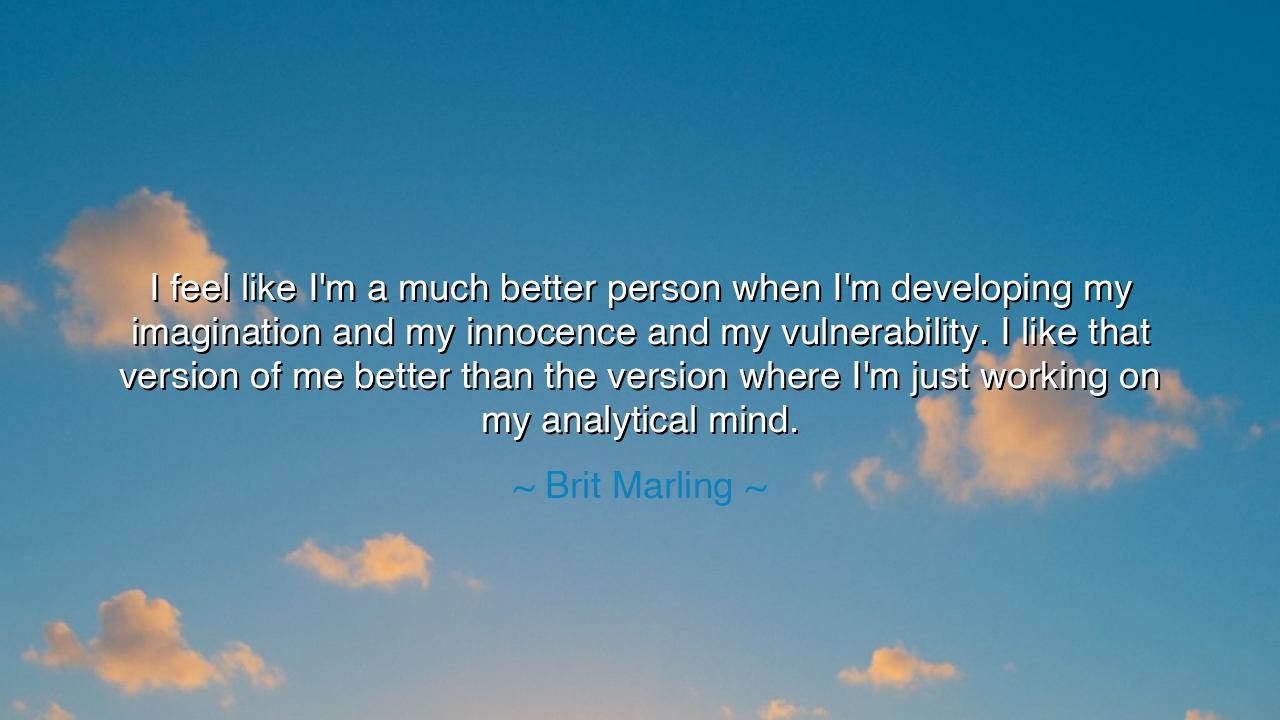
I feel like I'm a much better person when I'm developing my
I feel like I'm a much better person when I'm developing my imagination and my innocence and my vulnerability. I like that version of me better than the version where I'm just working on my analytical mind.






“I feel like I'm a much better person when I'm developing my imagination and my innocence and my vulnerability. I like that version of me better than the version where I'm just working on my analytical mind.” – Brit Marling
In these luminous words, Brit Marling, the actress, writer, and philosopher of the screen, unveils a truth that transcends time — a truth known to sages and poets long before the modern age. She speaks of the sacred harmony between the heart and the mind, between imagination and reason, and between the tender vulnerability of the soul and the rigid armor of intellect. Hers is not a rejection of the analytical, but a return to balance — a remembering of what it means to be fully human. In her confession, she reminds us that wisdom is not born only of logic, but of wonder; not of calculation, but of compassion.
To “develop imagination, innocence, and vulnerability” is to nurture the very qualities that the modern world often teaches us to suppress. We are trained to sharpen our intellect, to analyze, to calculate — yet in doing so, we risk hardening the spirit. Imagination allows us to see not only what is, but what could be. Innocence gives us the courage to trust again, to marvel at life’s mysteries without cynicism. Vulnerability opens the heart, allowing us to love, to connect, to be moved. These qualities make us softer, yes — but also more alive. Marling’s wisdom lies in her recognition that the best version of the self is not the one that conquers, but the one that feels.
The ancients, too, spoke of this sacred balance. The philosopher Plato taught that reason without imagination is blind, and imagination without reason is chaos. The human being, he said, must cultivate both — the analytical mind to discern truth, and the imaginative soul to dream it into being. Similarly, Leonardo da Vinci, that great union of artist and scientist, found genius not in logic alone, but in wonder. His notebooks are filled not only with mathematical precision but with the poetry of curiosity — the flight of birds, the motion of water, the mystery of the human face. It was his childlike awe, his innocence of vision, that made his intellect divine.
Yet Marling’s words are also deeply personal, echoing the inner struggle of our age — the war between productivity and creativity, between doing and being. In her world of film and storytelling, the imagination is both her tool and her temple. But she recognizes that imagination cannot thrive in the same soil as relentless analysis. The analytical mind dissects, categorizes, and judges; the imaginative heart explores, trusts, and creates. When one dominates the other, the soul becomes lopsided. Too much intellect, and we grow cold. Too much dream, and we lose direction. But when the two are joined in harmony, humanity ascends.
Consider the story of Albert Einstein, who once said, “Imagination is more important than knowledge.” Though the greatest physicist of his age, Einstein found his breakthroughs not through pure logic, but through the imaginative leap — visualizing himself riding upon a beam of light, seeing the universe not through equations first, but through vision. It was only later that the analytical mind translated his dream into the language of mathematics. Thus, even science, that fortress of reason, is guided by imagination. Einstein himself confessed that without his childlike curiosity — that sense of wonder untouched by cynicism — he would never have discovered truth.
In her reflection, Marling also speaks of innocence and vulnerability, two qualities often mistaken for weakness but in truth the foundations of strength. To be innocent is not to be naive, but to remain open to life’s possibility. To be vulnerable is not to be fragile, but to be courageous enough to feel deeply. These are the qualities that connect us to others, that make art, love, and empathy possible. The analytical mind can build cities and empires, but it is the imaginative heart that fills them with soul.
So let the teaching of Brit Marling be carried forward: cultivate your intellect, but do not let it consume the gentle powers of your imagination. In a world that demands constant logic and defense, dare to remain open, innocent, and tender. Spend time in silence. Dream without purpose. Feel without apology. For the greatest achievements of humanity have always sprung from the soil of those who were brave enough to imagine.
Remember this, then, as you walk the path of life: the analytical mind may lead you to success, but it is your imagination — illuminated by innocence, strengthened by vulnerability — that will lead you to wisdom, to love, and to truth. Nurture that version of yourself, for it is the one closest to the divine.






AAdministratorAdministrator
Welcome, honored guests. Please leave a comment, we will respond soon